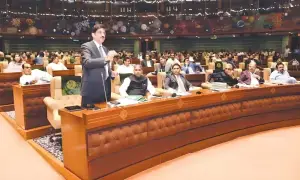SC says there’s no provision in laws to fire a govt employee by means of words
3 min readThe Supreme Court Friday said there is no provision in the labour laws or the service laws that permit termination of a government employee’s service verbally without a written order.
A three-member bench, headed by Chief Justice Gulzar Ahmed, passed the judgment on an appeal of chairman Agriculture Policy Institute, Ministry of National Food Security and Research.
Chairman Agriculture Policy Institute had appointed five persons on daily wage basis for a period of 89 days. The period was extended from time to time and lastly it was extended on 11.1.2012. Zulqarnain Ali (respondent) was among the persons, appointed on daily wages basis, as a driver on 01-04-2011.
According to Zulqarnain’s contention before the Federal Service Tribunal (FST), his service was terminated in July 2012 through a verbal order. He filed a departmental appeal, which was dismissed on 31-07-2012. He then approached the FST against that order.
The Tribunal set aside the termination order with the directions to reinstate the respondent in service with back benefits. The department challenged the Tribunal order before the apex court.
The judgment said that the verbal termination order was illegal hence the Tribunal rightly set aside the termination order with the directions to the petitioners to reinstate the respondent in service with back benefits and also dealt with the intervening period aptly.
The judgment authored by Justice Muhammad Ali Mazhar said there is no provision in the Labour Laws or the Service Laws permitting the employer to terminate the services verbally without a written order containing the explicit reasons or cause of termination even in the case of termination simpliciter and for disciplinary proceedings on account of misconduct, obviously separate procedure is laid down which accentuates the issuance of show cause notice, holding inquiry unless dispensed with by the competent authority considering all attending circumstances of the case and after personal hearing, appropriate action may be taken in accordance with the law.
The termination of service by a verbal order is alien to the labour and service laws of this country and also against the principle of good governance which is a process of gauging whether the government, its departments/institutions and authorities are conducting their affairs lawfully and performing their duties honestly, conscientiously and transparently including their process of decision making in accordance with rules and regulations.
The verbal termination order is otherwise against the principle of natural justice which turn of phrase was originated from the Roman word “Jus Naturale”, which means principles and moralities of natural law, justice, equity, and good conscience that, is fervently and exuberantly founded in the judicial conscience.
The judgment said that it is an elementary rule of law that before taking any adverse action, the affected party must be given a fair opportunity to respond and defend the action. This principle does not lay down any differentiation or inequality between a quasi-judicial function and or an administrative function/action for applying evenly and uniformly to secure justice and prevent miscarriage of justice.
“Before taking any punitive or adverse action, putting to end the services of any employee/workman or civil servant, the precept of fairness and reasonableness commands that an even handed opportunity to put forth the defence should be afforded,” added the judgment.
This story was first published in Business Recorder on Dec 25, 2021.
For the latest news, follow us on Twitter @Aaj_Urdu. We are also on Facebook, Instagram and YouTube.























Comments are closed on this story.